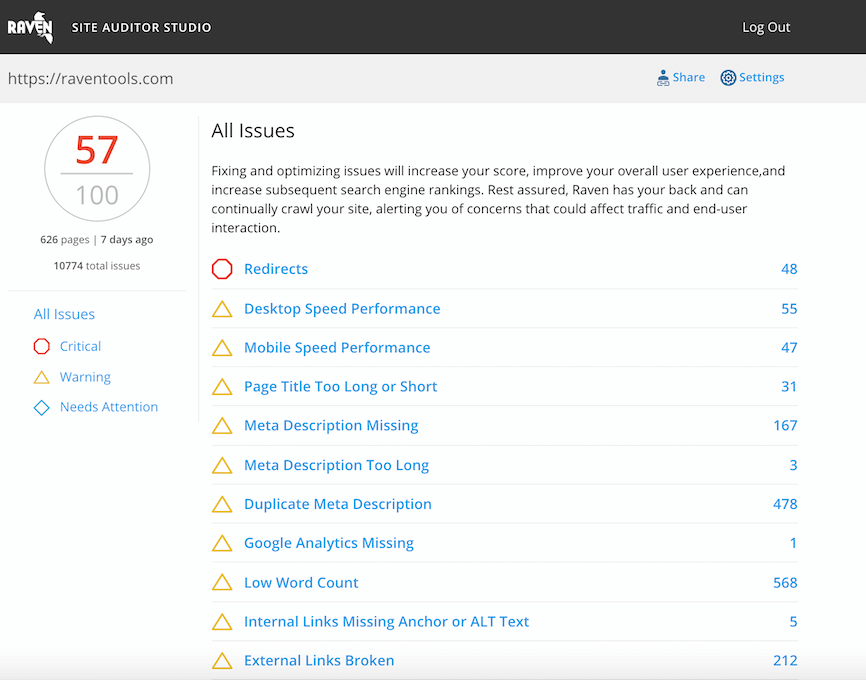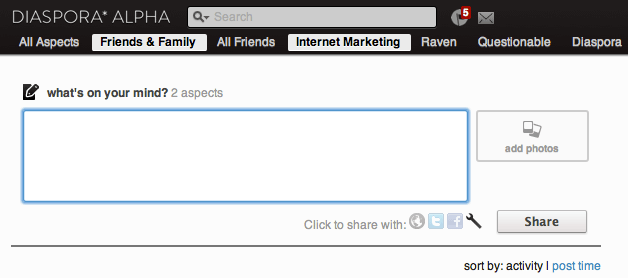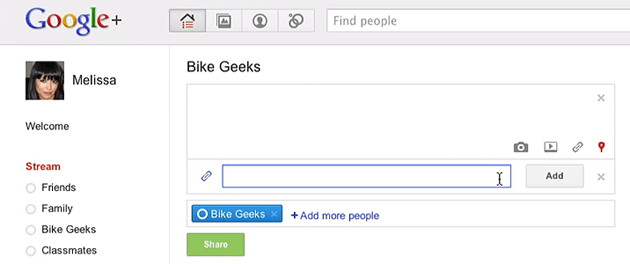After a painful series of failed attempts to compete with other social networks, Google is giving it another go with a new service called the Google+ project. The key features of Google+ include text and video chatting (Huddle and Hangouts), automatic sharing of photos (Instant Upload), the ability to discover interesting content (Sparks), and intuitive controls for sharing content with connections (Circles). If all of those features sound familiar, it’s because they are.
The majority of Google+’s features appear to be borrowed from their competitors, namely Facebook and Apple. There is however one key feature that was blatantly ripped off inspired from a fledgling open source social platform called Diaspora. That feature is called Circles, also known as Aspects to those familiar with Diaspora.
Discrete organization and control
The creators of Diaspora recognized that we’re connected to all types of people online. Those connections can include close friends, co-workers, clients, acquaintances and many others. They wanted to make it easier to categorize those connections so you could have better control of how you communicate with them. Their solution was Aspects.
Aspects are the way you group your contacts on Diaspora. An Aspect is one of the faces you show to the world. It might be who you are at work, or who you are to your family, or who you are to your college friends.
In Diaspora you choose which Aspects you want to share new messages with. You can choose one Aspect, several or all of them. One of the best features of Aspects is that nobody knows which Aspects they’re in. Aspects are unique to each account.
Google+ Circles works almost exactly the same way as Diaspora Aspects.
In Diaspora you click on the Aspects you want to share your new post with. Then you post the message and only the connections associated with those Aspects can see your post.
Google+ works similarly, in that you click on a Circle in your stream, and if you want to share with an additional Circle or friend, you can click on the Add More People link.
The future of Diaspora is now in doubt
The appeal of Diaspora was that it was decentralized and managed by the user. It was created as the anti-Facebook for those who wanted better privacy and control over the information they share with their connections. Unfortunately, there have been a lot of things deterring its success.
One of their biggest problems has been time and resources. Diaspora is an ambitious project, but it continues to struggle with the release of new features and enhancements. An even bigger problem they’ve been facing is the technology they chose to build it on. Instead of using technologies like PHP that are widely supported by almost all hosting providers, they chose to build it on less supported technologies like Ruby and MongoDB (although they have since switched to MySQL). They also chose to adopt somewhat experimental specs like OStatus that are still a work in progress. Even with those technologies working well together, it’s still difficult for the average person to set up Diaspora on their hosting account.
And then there’s Google+.
Google took the best part of Diaspora and made it even better. Google’s version of Aspects provides a much more intuitive way to interact with your connections. The Stream list view of Circles and the new message interface are much more desirable than what Diaspora currently offers. Google+ also provides a lot more features than Diaspora – features whose only real competition is Facebook and Apple.
My gut tells me that Google may have it right this time. Through the liberal assimilation of others’ innovations – think Android – they appear to have cherry-picked some of the best ideas, and have added a little innovation of their own. Deeply integrating the Google+ service with the rest of their platform (search, docs, email, etc…) may have them well on their way to becoming the center of our online universe.

Analyze over 20 different technical SEO issues and create to-do lists for your team while sending error reports to your client.





